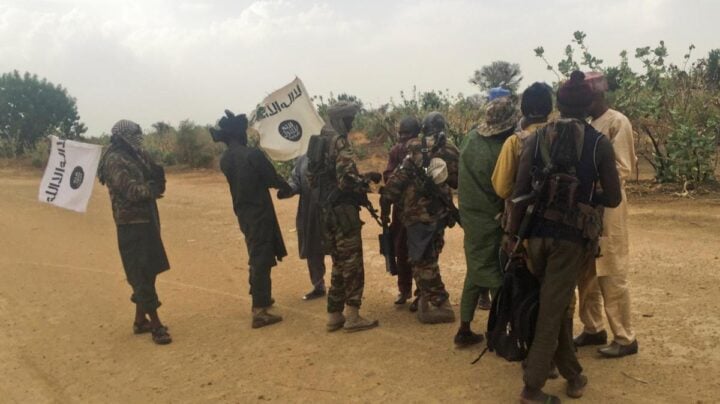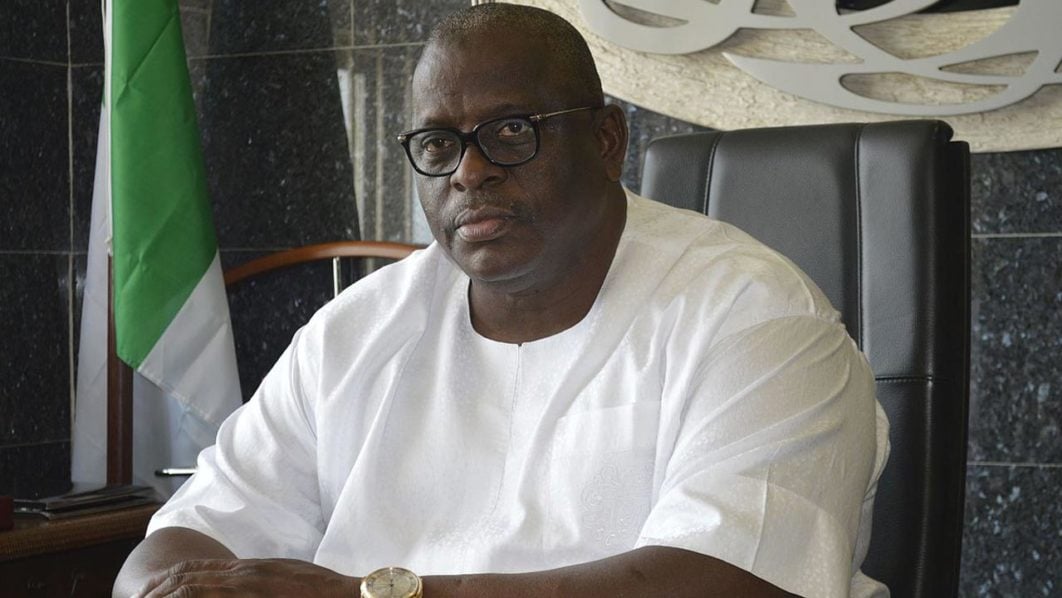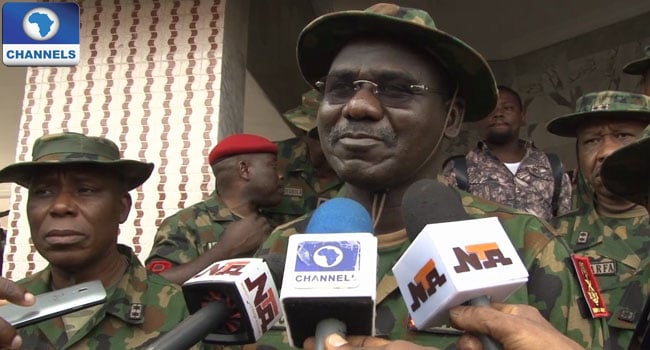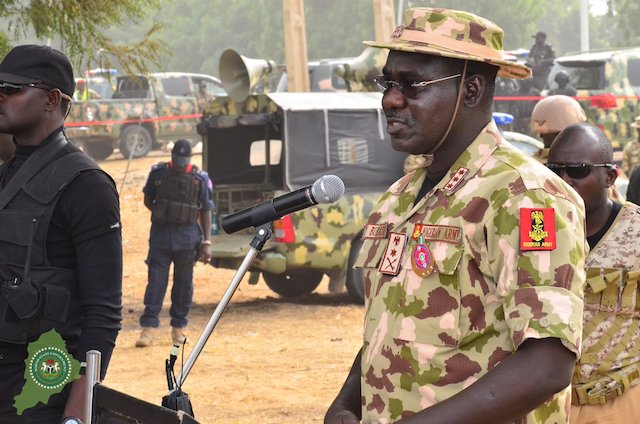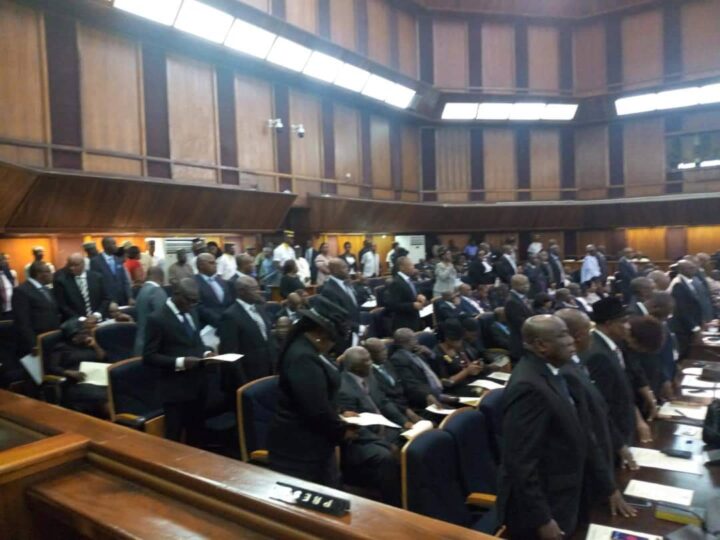BY ESTHER OKPABI
Public affairs analyst, John C. Maxwell, once echoed that “The best leaders are readers of people. They have the intuitive ability to understand others by discerning how they feel and recognizing what they sense.” President Muhammadu Buhari is one such archetypal leader whose one unyielding obsession was Boko Haram insurgency, when he emerged as Nigeria’s democratic leader in 2015.
President Buhari knew Nigeria was under suffocating siege by Boko Haram insurgency. It was apparent that if his national government hedges in firmly and squarely tackling and uprooting terrorism from the shores of Nigeria, it was as good as bidding farewell to the corporate existence of the nation. He knew Nigeria wanted to reclaim their country from terrorists; live in peace and security.
And the problems were multiple. He inherited a demoralized, unmotivated and poorly equipped military, led by an inept leadership. Soldiers in the trenches fighting Boko Haram were owed salaries and allowances. They operated more like unwilling horses.
Advertisement
The shame of Nigeria manifested when Nigerian troops of the Nigerian Army 213 battalion, Operation Task Force Mike and 234 battalion, shirked from the battlefront in Gwoza township as they approached the Islamists militant Boko Haram from Madagali in 2014 in the Northeast.
This expressed supremacy of Boko Haram insurgents, which seriously bruised the pride and dignity of the Nigerian nation-state was the signpost of the extent the terrorists had taken over Nigeria. The factsheet revealed that by May 2015 when President Buhari mounted the saddle as Nigeria’s leader, Boko Haram had effectively captured, controlled and administered 17 LGAs in the Northeast. The insurgents also established partial control of another seven local government areas in the region.
A greater number of the sensationally abducted Chibok schoolgirls by insurgents were still in captivity and generally, over 20, 000 Nigerians, comprising women and children were held hostage by the Islamic militants. Camps for Internally Displaced Persons (IDPs) dotted the landscapes of the Northeast, as thousands fled Nigeria to neighbouring countries.
Advertisement
A United Nations (UN) report estimated that over 2.4 million Nigerians were displaced by Boko Haram insurgency. In a media interview in 2013, the then President Goodluck Jonathan said, Boko Haram insurgency has claimed the lives of over 13, 000 Nigerians.
Abuja, Nigeria’s Federal Capital Territory (FCT) became Boko Haram’s favourite striking point. They attacked the UN Building, security formations, shopping malls, motor parks and a dozen other places on a daily basis. Fear, pains, agonies, deaths and destructions in most parts of Northern Nigeria were the bitter pills insurgents forced Nigerians to swallow unmolested.
President Buhari reviewed the scenario and understood the wisdom of a commentator, PeteHoekstra, who said, “Real leadership is leaders recognizing that they serve the people that they lead.” Buhari knew Nigerians needed his service in extricating them from the claws of lethal terrorism.
Thus, President Buhari’s first official directive on his Inauguration day was that the Nigerian Military Command should relocate to Maiduguri from Abuja to battle Boko Haram.
Advertisement
Buhari stated in his speech that, “The command centre will be relocated to Maiduguri and remain until Boko Haram is completely subdued. But we cannot claim to have defeated Boko Haram without rescuing the Chibok girls and all other innocent persons held hostage by insurgents.”
Next, President Buhari knew it was imperative to inject fresh blood into the military leadership in the country. And in July 2015, Nigeria had a new set of Service Chiefs and Lt. Gen. T.Y. Buratai was appointed the Chief of Army Staff (COAS) and leader of the counter-insurgency operations in the country.
And believing in the principle of John MacAthur who knows “A leader focuses on objectives, not obstacles,” in Gen. Buratai’s first verbal interface with Nigerians on the Boko Haram terrorism, he vowed to confront the insurgents fearlessly and decimate them by December 2015.
The President now re-equipped the empty armory of the Nigerian military to adequately arm them for the ardous task and to conquer all obstacle on their path to corner victory. He also prioritized payment of salaries and allowances of Nigerian military, especially troops in the trenches. It was a tonic that revived the dampened spirit of troops, who were in high spirits and went to extra miles in crushing insurgents.
Advertisement
Therefore, President Buhari’s rejig of the Military’s top echelon was a major setback to the terrorists, who were persistently assailed and defiantly by Nigerian troops on the battlefield. Gen. Buratai migrated the counter-insurgency war to the doorstep of the terrorists and begun to record streaks of victories for Nigeria.
In essence, by December 2015, the administration of President Buhari had successfully subdued and decimated Boko Haram insurgency. By the turn of 2016, the Buhari President started reclaiming Nigerian territories seized and occupied by insurgents in the Northeast. And December of the same year, Nigerian troops, invaded and captured the dreaded Sambisa forest, by penetrating its Camp Zero, the safe haven of Boko Haram’s factional leader, Abubakar Shekau and other top commanders.
Advertisement
Looking back at yesterday, President Buhari’s imprints in battling insurgency in Nigeria in the past three years have posted rewarding and impressive results. Over 16, 000 Nigerians under Boko Haram captivity have been rescued and reunited with their families and communities. Over 100 of the Chibok schoolgirls have been rescued and nearly all the Dapchi schoolgirls were expeditiously rescued from their captors.
Majority of the IDPs camps in the Northeast have been dismantled, as thousands of IDPs, including those in the diaspora have returned to deserted communities and villages in secured environments. Quite significantly, the Buhari Presidency has now confined the atrocities of Boko Haram to the fringes of Lake Chad Basin and far-flung areas of the Sambisa forest enclave.
Advertisement
The Buhari Presidency has not just stopped Boko Haram from capturing more territories, but no Nigerian territory is under Boko Haram occupation now. All the 17 LGAS have been retaken by Nigerian troops. And all religious and traditional rulers dislodged or deposed by insurgents in the Northeast have been restored on their positions. Most cities in the Northeast, under the furnace of the Islamic militants like Maiduguri and Damaturu now bubbles with life, as another sign of the restoration of normalcy.
In the words of Peter Drucker, “Effective leadership is not about making speeches or being liked; leadership is defined by results not attributes.” So, President Buhari sauntered on Nigeria’s leadership pulpit and immediately grasped the enormity and severity of the menace of Boko Haram. He spoke less or, showcased his leadership through actions than words.
Advertisement
Today, Boko Haram is an emaciated monster in the country, as their capacity to recklessly visit horrendous atrocities on Nigerians has been decapitated considerably. And President Buhari is currently angling for the final defeat of Boko Haram insurgency with Nigerian troops ongoing clearance operations in the region.
Nonetheless, the victory of Nigeria over Boko Haram has come with a great cost in human and material resources to the nation. To Nigerians who have paid the supreme price and still battling against insurgency, President Buhari consoles or encourages with the words of Steve Buyer thus; “For those who have made the ultimate sacrifice, we are grateful that such men and women were among us. For those who continue to serve, we honor their commitment. For those who return to civilian life, we honor their service.”
Okpabi, a researcher in Peace and Conflict Resolution wrote from the Nile University of Nigeria, Abuja.
Add a comment
